Publications
View a selection of books, book chapters, journal articles, conference papers and the Springer Book Series published by academics associated with the Australian Centre
2023
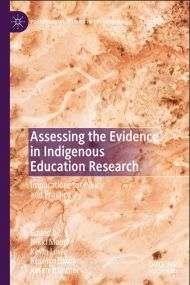
Editors: Nikki Moodie, Kevin Lowe, Roselyn Dixon, Karen Trimmer. Assessing the Evidence in Indigenous Education Research.
Implications for Policy and Practice
This book forms part of the series: Postcolonial Studies in Education (PCSE).
This book explores the current state of research on Indigenous education in Australia. In particular, these chapters focus on exploring deep and enduring questions about the failures of schooling to address the needs of Aboriginal communities. This book provides a systematic analysis of existing research to explain how connection to culture - and the recognition of Indigenous sovereignties and knowledges - are the keys to Aboriginal excellence in schooling.
2022

Little, A. Temporal Politics Contested Pasts, Uncertain Futures
Adrian Little demonstrates the ways in which different conceptions of past, present and future contribute to the nature of political conflict in the world today. Reacting against narratives of political disillusionment and apathy, he focuses on how a new understanding of political temporality can inform our approach to political problems. Little develops a theory of temporality focused on material politics. His argument is formed around three major cases in which the nature of past, present and future is contested: Indigenous politics in settler colonies, the politics of bordering and migration and the debates over the future of democracy. He shows how to rethink ways in which we can act on intractable issues in politics beyond philosophical analysis. In doing so he brings together a theory of temporality with a model of political action derived from process philosophy to reinvigorate temporal understandings of the problems that political actors face.
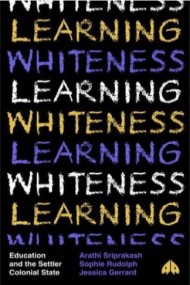
Rudolph, Sophie., Sriprakash. Arathi,.Gerrard, Jessica. Learning Whiteness: Education and the Settler Colonial State
Whiteness is not innate – it is learned. The systems of white domination that prevail across the world are not pregiven or natural. Rather, they are forged and sustained in social and political life.Learning Whiteness examines the material conditions, knowledge politics and complex feelings that create and relay systems of racial domination. Focusing on Australia, the authors demonstrate how whiteness is fundamentally an educational project – taught within education institutions and through public discourse – in active service of the settler colonial state.To see whiteness as learned is to recognise that it can be confronted. This book invites readers to reckon with past and present politics of education in order to imagine a future thoroughly divested from racism.
2020
López, Ligia (Licho), Coello, Gioconda. Indigenous Futures and Learnings Taking Place
Singularizing progressive time binds pasts, presents, and futures to cause-effect chains overdetermining existence in education and social life more broadly. Indigenous Futures and Learnings Taking Place disrupts the common sense of "futures" in education or "knowledge for the future" by examining the multiplicity of possible destinies in coexistent experiences of living and learning.
Taking place is the intention this book has to embody and world multiplicity across the landscapes that sustain life. The book contends that Indigenous perspectives open spaces for new forms of sociality and relationships with knowledge, time, and landscapes. Through Goanna walking and caring for Country; conjuring encounters between forests, humans, and the more-than-human; dreams, dream literacies, and planes of existence; the spirit realm taking place; ancestral luchas; Musquem hən̓q̓əmin̓əm̓ Land pedagogies; and resoluteness and gratitude for atunhetsla/the spirit within, the chapters in the collection become politicocultural and (hi)storical statements challenging the singular order of the future towards multiple encounters of all that is to come. In doing so, Indigenous Futures and Learnings Taking Place offers various points of departure to (hi)story educational futures more responsive to the multiplicities of lives in what has not yet become. The contributors in this volume are Indigenous women, women of Indigenous backgrounds, Black, Red, and Brown women, and women whose scholarship is committed to Indigenous matters across spaces and times. Their work in the chapters often defies prescriptions of academic conventions, and at times occupies them to enunciate ontologies of the not yet. As people historically fabricated "women," their scholarly production critically intervenes on time to break teleological education that births patriarchal-ized and master-ized forms of living. What emerges are presences that undiscipline education and educationalized social life breaking futures out of time.
This book will be of great interest to students and scholars of Indigenous studies, future studies, post-colonial studies in education, settler colonialism and coloniality, diversity and multiculturalism in education, and international comparative education.
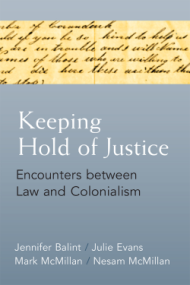
Balint, Jennifer, Evans, Julie., McMillian, Mark and McMillan, Nesam. Keeping Hold of Justice: Encounters Between Law and Colonialism
Keeping Hold of Justice focuses on a select range of encounters between law and colonialism from the early nineteenth century to the present. It emphasizes the nature of colonialism as a distinctively structural injustice, one which becomes entrenched in the social, political, legal, and discursive structures of societies and thereby continues to affect people's lives in the present. It charts, in particular, the role of law in both enabling and sustaining colonial injustice and in recognizing and redressing it. In so doing, the book seeks to demonstrate the possibilities for structural justice that still exist despite the enduring legacies and harms of colonialism. It puts forward that these possibilities can be found through collaborative methodologies and practices, such as those informing this book, that actively bring together different disciplines, peoples, temporalities, laws and ways of knowing. They reveal law not only as a source of colonial harm but also as a potential means of keeping hold of justice.
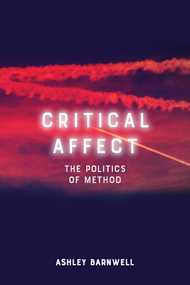
Barnwell, Ashley. Critical Affect: The Politics of Method. Edinburgh University Press, 2020
Critical Affect explores the emotional complexity of critique and maps out its enduring value for the turn to affect and ontology. Through a series of vivid close readings, Ashley Barnwell shows how suspicion and methods of decoding remain vital to both civic and academic spaces, where concerns about precarity, transparency, and security are commonplace and the question of how we verify the truth is one of the most polarising of our age.
The book addresses the important yet overlooked implications for critical methods in influential work on affect, non-representational, and actor-network theories and situates current debates within enduring ethical discussions about how to represent lived experience.
2019

Why white Australia can't
solve black problems
Maddison, Sarah. The Colonial Fantasy: Why white Australia can't solve black problems. Allen & Unwin, 2019.
Australia is wreaking devastation on Aboriginal and Torres Strait Islander people. Whatever the policy, government has done little to improve the quality of life of Indigenous people. In far too many instances, interaction with governments has only made Indigenous lives worse. Despite this, many Indigenous and non-Indigenous leaders and commentators still believe that working with the state is the only viable option. The result is constant churn and reinvention in Indigenous affairs, as politicians battle over the 'right' approach to solving Indigenous problems.
The Colonial Fantasy considers why Australia persists in the face of such obvious failure. It argues that white Australia can't solve black problems because white Australia is the problem, and calls for a radical restructuring of the relationship between black and white Australia.
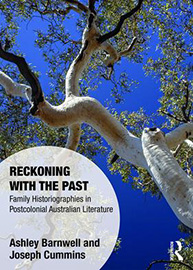
Family Historiographies in
Postcolonial Australian Literature
Barnwell, Ashley and Cummins, Joseph. Reckoning with the Past: Family Historiographies in Postcolonial Australian Literature. Routledge, 2019
This is the first book to examine how Australian fiction writers draw on family histories to reckon with the nation's colonial past. Located at the intersection of literature, history, and sociology, it explores the relationships between family storytelling, memory, and postcolonial identity. With attention to the political potential of family histories, Reckoning with the Past argues that authors' often autobiographical works enable us to uncover, confront, and revise national mythologies. An important contribution to the emerging global conversation about multidirectional memory and the need to attend to the effects of colonisation, this book will appeal to an interdisciplinary field of scholarly readers.
Douglas, Kate and Barnwell, Ashley (eds.,). Research Methodologies for Auto/Biography Studies. Routledge, 2019
This collection of short essays provides a rigorous, rich, collaborative space in which scholars and practitioners debate the value of different methodological approaches to the study of life narratives and explore a diverse range of interdisciplinary methods. Auto/biography studies has been one of the most vibrant sub-disciplines to emerge in the humanities and social sciences in the past decade, providing significant links between disciplines including literary studies, languages, linguistics, digital humanities, medical humanities, creative writing, history, gender studies, education, sociology, and anthropology.
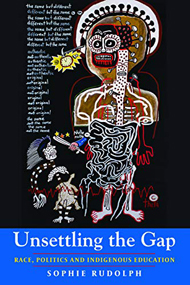
Rudolph, Sophie Unsettling the Gap: Race, politics and Indigenous education. Peter Lang, 2019.
Unsettling the Gap: Race, Politics and Indigenous Education examines pressing issues of inequality in education. The notion of gap – and the need to close it – is used widely in public and policy debates to name the nature and scope of disadvantage. In the competitive world of education, gaps have become associated with students who are seen to be “falling behind,” “failing” or “dropping out.” A global deficit discourse is, therefore, mobilised and normalised. But this discourse has a history and is deeply political. Unsettling the Gap examines this history and how it is politically activated through an analysis of the “Australian Closing the Gap in Indigenous Disadvantage” policy. In this policy discourse the notion of gap serves as a complex and multiple signifier, attached to individuals, communities and to national history.
In unravelling these diverse modalities of gap, the text illuminates the types of ruling binaries that tend to direct dynamics of power and knowledge in a settler colonial context. This reveals not only the features of the crisis of "Indigenous educational disadvantage" that the policy seeks to address, but the undercurrents of a different type of crisis, namely the authority of the settler colonial state. By unsettling the normalised functions of gap discourse the book urges critical reflections on the problem of settler colonial authority and how it constrains the possibilities of Indigenous educational justice.
2018
López López, Ligia (Licho) The Making of Indigeneity, Curriculum History, and the limits of Diversity Routledge, 2018
Conceptually rich and grounded in cutting-edge research, this book addresses the often-overlooked roles and implications of diversity and indigeneity in curriculum. Taking a multidisciplinary approach to the development of teacher education in Guatemala, López provides a historical and transnational understanding of how "indigenous" has been negotiated as a subject/object of scientific inquiry in education. Moving beyond the generally accepted "common sense" markers of diversity such as race, gender, and ethnicity, López focuses on the often-ignored histories behind the development of these markers, and the crucial implications these histories have in education – in Guatemala and beyond – today.
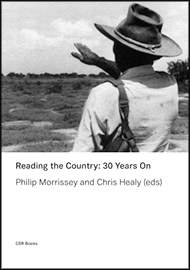
Morrissey, Philip and Healy, Chris (eds.). Reading the Country: 30 Years On. UTS ePress, 2018
Steeped in story-telling and endlessly curious, Reading the Country: An Introduction to Nomadology (1984) was the product of Paddy Roe, Stephen Muecke and Krim Benterrak experimenting with what it might be like to think together about country. Their book has since become one of the great twentieth-century works of intercultural dialogue.
Reading the Country: 30 Years On is a celebration of that book - examining not only its place and time of creation but also its movement across social, philosophical and political surfaces, seeping into the way we look and learn and teach about how people are, or could be, part of country.
Nolan, David, Farquharson, Karent and Marjoribanks, Timothy (eds.). Australian Media and the Politics of Belonging. Anthem Press, 2018
Australian Media and the Politics of Belonging explores mediated debates about belonging in contemporary Australia by combining research that proposes conceptual and historical frameworks for understanding the concept in the Australian context. A range of themes and case studies make the book a significant conceptual resource as well as a much-needed update on work in this area. Australian Media and the Politics of Belonging also provides an intervention that engages with key contemporary issues, questions and problems around the politics of belonging that are relevant not only to academic debate, but also to contemporary policy development and media and popular discussion.
2017
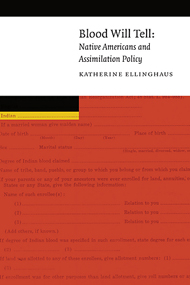
and Assimilation Policy
Ellinghaus, Katherine. Blood Will Tell: Native Americans and Assimilation Policy. University of Nebraska Press, 2017
Blood Will Tell reveals the underlying centrality of "blood" that shaped official ideas about who was eligible to be defined as Indian by the General Allotment Act in the United States. Katherine Ellinghaus traces the idea of blood quantum and how the concept came to dominate Native identity and national status between 1887 and 1934 and how related exclusionary policies functioned to dispossess Native people of their land. The U.S. government’s unspoken assumption at the time was that Natives of mixed descent were undeserving of tribal status and benefits, notwithstanding that Native Americans of mixed descent played crucial roles in the national implementation of allotment policy.
The role of blood quantum is integral to understanding how Native Americans came to be one of the most disadvantaged groups in the United States, and it remains a significant part of present-day debates about Indian identity and tribal membership. Blood Will Tell is an important and timely contribution to current political and scholarly debates.
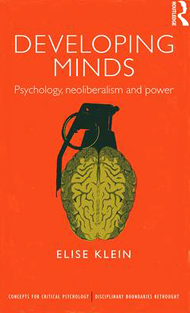
neoliberalism and power
Klein, Elise. Developing Minds: Psychology, neoliberalism and power. Routledge, 2017
Development policy makers and practitioners are becoming increasingly sophisticated in their ability to target 'development' interventions and the psychological domain is now a specific frontier of their interventional focus. This landmark study considers the problematic relationship between development and psychology, tracing the deployment of psychological knowledge in the production/reproduction of power relations within the context of neoliberal development policy and intervention. It examines knowledge production and implementation by actors of development policy such as the World Bank and the neo-colonial state - and ends by examining the proposition of a critical psychology for more emancipatory forms of development.
The role of psychology in development studies remains a relatively unexplored area, with limited scholarship available. This important book aims to fill that gap by using critical psychology perspectives to explore the focus of the psychological domain of agency in development interventions. It will be essential reading for students, researchers, and policy makers from fields including critical psychology, social psychology, development studies and anthropology.
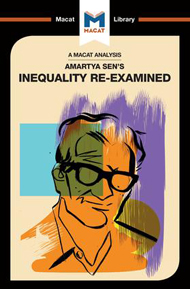
Inequality Re-examined
Klein, Elise. Reading Amartya Sen’s Inequality Re-examined. Routledge, 2017
Amartya Sen's Inequality Re-examined is a seminal text setting out a theory to evaluate social arrangements and inequality. By asking the question, 'equality of what'?, Sen shows that (in)equality should be assessed as human freedom; for people to have the ability to pursue and achieve goals they value or have reason to value.
The text lays out the fundamental ideas to Amartya Sen's Capability Approach. This approach is celebrated in diverse academic disciplines because of its specific contribution towards the improvement to debates on inequality beyond economic deprivation and utility measures. Furthermore, the arguments put forward by Sen in Inequality Re-examined has had many practical applications throughout policy circles including the Human Development Index, the Multi-Dimensional Poverty Measure, the compilation of lists of capabilities and drawing further attention to human agency and democracy. Amartya Sen won the Nobel Prize for Economics in 1998 for his contribution to welfare economics; the core arguments of this work is found in this book.
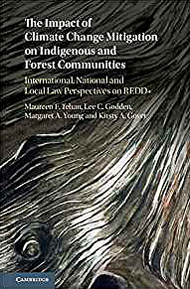
Mitigation on Indigenous
and Forest Communities
Tehan, Maureen, Godden, Lee, Young, Margaret, and Gover, Kirsty. The Impact of Climate Change Mitigation on Indigenous and Forest Communities: International, National and Local Law Perspectives on REDD+. Cambridge University Press, 2017
The international legal framework for valuing the carbon stored in forests, known as 'Reducing Emissions from Deforestation and Forest Degradation' (REDD+), will have a major impact on indigenous peoples and forest communities. The REDD+ regime contains many assumptions about the identity, tenure and rights of indigenous and local communities who inhabit, use or claim rights to forested lands. The authors bring together expert analysis of public international law, climate change treaties, property law, human rights and indigenous customary land tenure to provide a systemic account of the laws governing forest carbon sequestration and their interaction. Their work covers recent developments in climate change law, including the Agreement from the Conference of the Parties in Paris that came into force in 2016. The Impact of Climate Change Mitigation on Indigenous and Forest Communities is a rich and much-needed new contribution to contemporary understanding of this topic.
2016
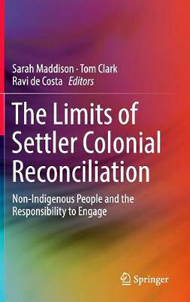
Colonial Reconciliation:
Non-Indigenous People and
the Responsibility to Engage
Maddison, Sarah, Clark, Tom, and de Costa, Ravi (eds.). The Limits of Settler Colonial Reconciliation: Non-Indigenous People and the Responsibility to Engage. Springer, 2016
This book investigates whether and how reconciliation in Australia and other settler colonial societies might connect to the attitudes of non-Indigenous people in ways that promote a deeper engagement with Indigenous needs and aspirations. It explores concepts and practices of reconciliation, considering the structural and attitudinal limits to such efforts in settler colonial countries. Bringing together contributions by the world's leading experts on settler colonialism and the politics of reconciliation, it complements current research approaches to the problems of responsibility and engagement between Aboriginal and non-Aboriginal peoples.
2015
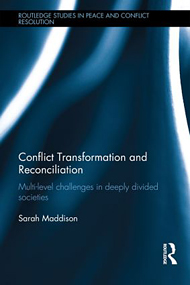
and reconciliation: Multi-level
challenges in deeply
divided societies
Maddison, Sarah. Conflict transformation and reconciliation: Multi-level challenges in deeply divided societies. Routledge, 2015
This book examines approaches to reconciliation and peacebuilding in settler colonial, post-conflict, and divided societies. In contrast to current literature, this book provides a broader assessment of reconciliation and conflict transformation by applying a distinctive 'multi-level' approach. The analysis provides a unique intervention in the field, one that significantly complicates received notions of reconciliation and transitional justice, and considers conflict transformation across the constitutional, institutional, and relational levels of society.
Drawing on extensive fieldwork in South Africa, Northern Ireland, Australia, and Guatemala, the work presents an interdisciplinary study of the complex political challenges facing societies attempting to transition either from violence and authoritarianism to peace and democracy, or from colonialism to post-colonialism. Informed by theories of agonistic democracy, the book conceives of reconciliation as a process that is deeply political, and that prioritises the capacity to retain and develop democratic political contest in societies that have, in other ways, been able to resolve their conflicts.
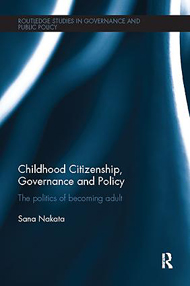
Governance and Policy: the
politics of becoming adult
Nakata, Sana. Childhood Citizenship, Governance and Policy: the politics of becoming adult. Routledge, 2015
Debates about children's rights not only concern those things that children have a right to have and to do but also our broader social and political community, and the moral and political status of the child within it.
This book examines children's rights and citizenship in the USA, UK and Australia and analyses the policy, law and sociology that govern the transition from childhood to adulthood. By examining existing debates on childhood citizenship, the author pursues the claim that childhood is the most heavily governed period of a liberal individual's life, and argues that childhood is an intensely monitored period that involves a 'politics of becoming adult'. Drawing upon case studies from the USA, the UK and Australia, this concept is used to critically analyse debates and policy concerning children's citizenship, criminality, and sexuality. In doing so, the book seeks to uncover what informs and limits how we think about, talk about, and govern children's rights in liberal societies.
Laidlaw, Zoe and Lester, Alan (eds.). Indigenous Communities and Settler Colonialism: Land Holding, Loss and Survival in an Interconnected World. Basingstoke: Palgrave Macmillan, Cambridge Imperial and Post-Colonial Studies series, 2015.
The new world created through Anglophone emigration in the 19th century has been much studied. But there have been few accounts of what this meant for the Indigenous populations. This book shows that Indigenous communities tenaciously held land in the midst of dispossession, whilst becoming interconnected through their struggles to do so.
2023
- Ford, L., Christie, M., Bow, C., Nasir, T., Spencer, M., Campbell, M., ... & Prior, J. (2021). Collaborative Research into Contemporary Indigenous Governance. LEADING FROM THE NORTH, 479.
- Moodie, N., Rudolph, S., Maxwell, J. (2023). Understanding the Evidence on Racism and Indigenous Schooling. In: Moodie, N., Lowe, K., Dixon, R., Trimmer, K. (eds) Assessing the Evidence in Indigenous Education Research. Postcolonial Studies in Education. Palgrave Macmillan, Cham. https://doi.org/10.1007/978-3-031-14306-9_4
2022
- Veracini, L. (2022). The Predicaments of Settler Gastrocolonialism. In: Ranta, R., Colás, A., Monterescu, D. (eds) ‘Going Native?'. Food and Identity in a Globalising World. Palgrave Macmillan, Cham.
- Moodie, N. (2022). Gender, Epistemic Violence, and Indigenous Resistance. Oxford University Press. The Oxford Handbook of Indigenous Sociology.
- Moodie (Gomeroi), D., Menzel (Ngadjuri), K., Cameron (Dharug), L. & Moodie (Gomeroi), N. (2022). Blak & Salty: reflections on violence and racism. Indigenous Women’s Voices Zed Books.
- Farquharson, K., Jeanes, R., Spaaij, R., Magee, J., Gorman, S. & Lusher, D. (2022). Developing participation opportunities for young people with disabilities? Policy enactment and social inclusion in Australian junior sport. The Potential of Community Sport for Social Inclusion.
- Laidlaw, Z. (2022). 'Peopling the Country by Unpeopling It': Jeremy Bentham's silences on Indigenous Australias. In Causer, T., Finn, M. & Schofield, P. (Eds.) Jeremy Bentham and Australia Convicts
2021
- May, A. (2021) "Affective Sociability, Neighbourly Relations and Australian Municipalism". In Katie Barclay & Jade Riddle (eds) Urban Emotions and the making of the City. 1 ed., Routledge
- Leane J. (2021) "Response to Natalie Harkin: A Labor of Love". In: Disney D., Hall M. (eds) New Directions in Contemporary Australian Poetry. Modern and Contemporary Poetry and Poetics.
- Barnwell, A (2021). "Family Secrets". Rewriting The Politics of Care, edited by Robinson, Macushla., 1 ed., Interstitial Press
- Strakosch. E., (2021) 'Indigenous-Settler Relationships: Policy, Rights, Reconciliation, and Sovereignty'. In: Lewis, J. M. , and Tiernan, A. (eds) The Oxford Handbook of Australian Politics. Oxford University Press: Oxford.
- Leanine, L & Harkin, N., (2021). "When records speak we listen" edited by Katherine Biber, Trish Luker, Priya Vaughan., 1 ed., Routledge
- Maddison, S, Hurst, J and Dale Wandin (Wurundjeri) (2021). 'The Mess of Colonialism, the Complexity of Treaty'. In: Alison Whittaker, Harry Hobbs, Lindon Coombes (eds.) Treaty-making: 250 Years Later, The Federation Press.
- Thomas, A., Andrew Jakubowicz and Heidi Norman (2021). 'Making Black stories matter: Understanding media narratives on treaty and Aboriginal aspirations'. In: Alison Whittaker, Harry Hobbs, Lindon Coombes (eds.) Treaty-making: 250 Years Later, The Federation Press.
- Prehn, J., Krakouer, J. and Fernando, T. (2021). 'The Intersectionality of Indigeneity and Gender in Australian Social Work. In: Bennett, Bindi. (ed.,). Aboriginal Fields of Practice, Red Globe Press: London, U, 3-25
- Lowe, K., Moodie, N and Weuffen, S. (2021) Refusing Reconciliation in Indigenous Curriculum. In: Bill Green, Philip Roberts, Marie Brennan (eds.) Curriculum Challenges and Opportunities in a Changing World: Transnational Perspectives in Curriculum Inquiry. 71-86.
- Balint, J., Evans, J., McMillan,M and McMillan, N (2021). Keeping Hold of Justice. Encounters between Law and Colonialism, University of Michigan Press.
- Hogarth, M. & Bunda, T. (2021). How to make a school less white. In: Brooks, J (Ed.). Heffernan, A (Ed.). The School Leadership Survival Guide: What to do when things go wrong, how to learn from mistakes, and why you should prepare for the worst, (1), pp.347-362. Information Age Publishing.
- Barnwell, A. (2021). Writing Family, Writing Nation in 1988: Inside the National Library of Australia’s Self-Published Family History Collection. In Allbrook, M. & Scott Brown, S. (eds.) Family History and Historians in Australia and New Zealand: Related Histories, Routledge.
2020
- Maddison, S. (2020). Separatism as a mode of relations: Practicing Indigenous resurgence and nationhood in the 21st century. In: Maddison, S. and Nakata, S. (eds.). Questioning Indigenous-Settler Relations: Interdisciplinary perspectives. Springer, pp. 147-158
- Maddison, S and Nakata, S. (2020). Introduction: Questioning Indigenous-Settler Relations: Reconciliation, recognition, responsibility. In: Maddison, S. and Nakata, S. (eds.). Questioning Indigenous-Settler Relations: Interdisciplinary perspectives. Springer, pp. 1-13.
- Nakata, S. (2020) Who is the self in Indigenous self-determination? In: edited by Rademaker, L., Rowse, T. (eds) Indigenous Self-Determination in Australia: Histories and Historiography, ANU Press, pages 335-353.
- Rudolph, S & Hogarth, M. (2020) Contested Citizenship Education in Settler Colonies on First Nations Land. In: Peterson A., Stahl G., Soong H. (eds) The Palgrave Handbook of Citizenship and Education. Palgrave Macmillan, Cham.
- Hogarth, M. (2020). Research-informed teacher learning as professional practice. In: Beckett, L. (Eds.) Research-Informed Teacher Learning (1 ed., pp. 1-11) Routledge.
- Hogarth, M. (2020). A personal response to the idea of research-informed teacher learning: A vignette. In: Beckett, L. (Eds.) Research-informed teacher learning: Critical perspectives on theory, research and practice (1 ed., pp. xix-xix) Routledge.
- Brown, L. (2020). From problems to possibilities: Regenerative concepts of Indigenous childhood & youth in cultural production. In: MacNeill, K. & Bolt, B. (Eds.) The meeting of aesthetics and ethics in the academy: challenges for creative practice researchers in higher education (1 ed., pp. 38-52) Routledge.
- Gover, K. (2020). From the Heart: The Indigenous Challenge to Australian Public Law. In Varuahs, J. & Wilson Stark, S. (Eds.) The Frontiers of Public Law (1 ed., pp. 205-226) Bloomsbury Professional.
- Kelada, O., Brown, L. & Jones, D. (2020). Racial Literacy: What Is Race and Why Is It So Important To Understand? In Lillie, J., Larsen, K., Kirkwood, C. & Brown, J. J. (Eds.) The Relationship Is the Project Working with Communities (1 ed., pp. 89-97) Brow Books.
2019
- Balint, J., Haslem, N. and Haydon, K. The Work of Peace: World War One, Justice and Translation Through Art, Erpelding, M., Hess, B. and Fabri, H.R. (eds.,) Peace Through Law: The Versailles Peace Treaty and Dispute Settlement After World War I. Nomos, pp. 337-354.
- Barnwell, A and Douglas, K. (2019). What we do when we do life writing: methodologies for auto/biography now, Douglas, Kate and Barnwell, Ashley (eds.,). Research Methodologies for Auto/biography Studies. Routledge.
- Edmonds, P. and Laidlaw, Z. (2019). “The British Government Is Now Awaking”: How Humanitarian Quakers Repackaged and Circulated the 1837 Select Committee Report on Aborigines,” Furphy, Samuel and Nettelbeck, Amanda (eds.,). Aboriginal Protection and Its Intermediaries in Britain’s Antipodean Colonies. Routledge.
- Farquharson, K., Spaaij, R., Gorman, S., Jeanes, R., Lusher, D. and Magee, J. (2019). Managing Racism on the Field in Junior Sport, Essed, P., Farquharson, K., Pillay, K. and White, E.J. (eds.,) Relating Worlds of Racism: Dehumanisation, Belonging, and the Normativity of European Whiteness. Palgrave Macmillan.
- Gover, K. (2020). Public Law, Legitimacy and Indigenous Aspirations. In Varuhas, J., & Stark, S. The Frontiers of Public Law. Hart
- Edmonds, P. & Laidlaw, Z. (2019). "The British Government Is Now Awaking": How Humanitarian Quakers Repackaged and Circulated the 1837 Select Committee Report on Aborigines. In Furphy, S. & Nettelback, A. (Eds.) Aboriginal Protection and Its Intermediaries in Britain’s Antipodean Colonies (1 ed., pp. 38-57) Routledge.
- Brown, L. (2019). The Wirlomin Books: Rooted in Language and Place. In MORRISSEY, P. & Campbell, M. (Eds.) Kim Scott: Readers, Language, Interpretation (1 ed., pp. 45-60) University of Western Australia Press.
- Brown, L. (2019). Re-imagining conceptions of Indigenous youth: Working toward an ethical scholarly engagement with textual and artistic representation. The Meeting of Aesthetics and Ethics in the Academy: Challenges for Creative Practice Researchers in Higher Education (pp. 38-52).
- Grieves, G. (2019). Just tick the box: A Koorie1 woman’s experience of negotiating the university’s ethics process. The Meeting of Aesthetics and Ethics in the Academy: Challenges for Creative Practice Researchers in Higher Education (pp. 101-109).
- Kelada, O & Clarke M. (2019). "Beyond the Wonderland of Whiteness". In A companion to Australian Cinema
2018
- Farquharson, K. “Creating Belonging: The possibilities and limitations of an organisational newsmedia intervention,” in Nolan, David; Farquharson, Karen and Marjoribanks, Timothy (eds.,). Australian Media and the Politics of Belonging. Anthem Press.
- Farquharson, K and Nolan, D. (2018). In a Context of Crime: Sudanese and South Sudanese Australians in the Media, Nolan, D., Farquharson, K. and Marjoribanks, T. (eds.,) Australian Media and the Politics of Belonging. Anthem Press.
- Healy, C. (2018). Reading the Country after Travelling Television,” in Morrissey, P. and Healy, C (eds.,). Reading the Country: 30 Years On. UTS ePress.
- Moodie, N. Decolonizing race theory: place, survivance and sovereignty, Vass, G., Maxwell, J., Rudolph, S. and Gulson, K.N. (eds.,). The Relationality of Race in Education Research. Routledge, pp 33-46
- Muller, D., Farquharson, K. and Nolan, D. (2018). Journalism practice, the police and Sudanese-Australians, Nolan, D., Farquharson, K. and Marjoribanks, T. (eds.,) Australian Media and the Politics of Belonging. Anthem Press.
- Nolan, D., Farquharson, K. and Marjoribanks, T. (2018). Australian media and the Politics of Belonging, Nolan, D., Farquharson, K. and Marjoribanks, T. (eds.,) Australian Media and the Politics of Belonging. Anthem Press.
- Gover, K. (2018). Equality and Non-Discrimination in the UNDRIP Articles 2, 6, and 7(1). In Hohmann, J. & Weller, M. (Eds.) The UN Declaration on the Rights of Indigenous Peoples: A Commentary (1 ed., pp. 179-212) Oxford University Press.
2017
- Farquharson, K., Nolan, D. and Marjoribanks, T. (2017). ‘Race’ and the lived experiences of Australians of Sudanese background, Boese, M. and Marotta, V. (eds.,). Critical Reflections on Migration, ‘Race’ and Multiculturalism: Australia in a Global Context. Routledge.
- Gover, K. (2017). The Treaty and Human Rights in New Zealand Law: Will the Common Law Presumptions Help or Hinder? Meagher, Dan and Groves, Matthew (eds.,). The Principle of Legality in Australia and New Zealand. Federation Press.
- Maddison, S. and Mills, J.(2017). Settler colonialism and genocide in Australia, Friedman, J. and Hewitt, W. (eds.,). The history of genocide in cinema: Atrocities on screen. I.B. Tauris.
2016
- Gover, K. (2016). Gender and Racial Discrimination in the Formation of Groups: Tribal and Liberal Approaches to Membership in Settler Societies, Rubenstein, Kim and Young, Katharine G. (eds.,). The Public Law of Gender: From the Local to the Global. Cambridge University Press.
- Gover, K. (2016). Indigenous Membership and Human Rights: When Self-identification meets Self-constitution. Lennox, Corinne and Short, Damien (eds.,). Handbook of Indigenous Peoples' Rights. Routledge.
- Gover, K. (2016). Liberal and Tribal Membership Boundaries: Descent, Consent, and Section 35. Macklemm Patrick and Sanderson, Douglas (eds.,). From Recognition to Reconciliation: Essays on the Constitutional Entrenchment of Aboriginal & Treaty Rights. University of Toronto Press.
- Gover, K. (2016). REDD+, Tenure and Indigenous Property: The Promise and Peril of a 'Human Rights-based Approach. Voigt, Christina (ed.,). Research Handbook on REDD+ and International Law. Edward Elgar Publishing Ltd, 249-288.
- Little, A. (2016). What is at Stake in Constitutional Recognition? Maddison, S., Clark, T. and da Costa, R. (eds.,). The Limits of Settler Colonial Reconciliation. Springer, 271-289.
- Maddison, S. (2016). Settler Australia in the twentieth century. Cavanagh, E. and Veracini, L. (eds.,). The Routledge handbook of the history of settler colonialism. Routledge, 425-438.
- Maddison, S. (2016). Indigenous peoples and colonial borders: Sovereignty, nationhood, identity and activism. Naples, N.A. and Bickham-Mendez, J. (eds.,). Border politics: Social movements, collective identities, and globalization. New York University Press, 153-176.
- Moodie, N. and Patrick, R.(2116). Indigenous Education Policy Discourses in Australia: Rethinking the “Problem. Barkatsos, T. and Bertram, A. (eds.,). Global Learning in the 21st Century. Sense Publishers, 165-184.
2024
2023
- Howe, Rebecca. (2023). Depathologising the future of trans health care: Does saying it make it so? Writing from Below, 6(1),
- Maddison, Sarah, Hurst, Julia and Thomas, Archie (2023). "The truth will set you free? The promises and pitfalls of truth‐telling for Indigenous emancipation." Social Inclusion.
- Howe, Rebecca. (2023). Unmapping social work scholarship about gender self-designation: reconstructing the basis for engagement. Critical and Radical Social Work, 11(2), pp. 279-294.
- Blow, Ngaree & Taiaroa, G. (2023). Centering Indigenous voices in health. The Lancet, 1-2.
- Veracini, L. (2023). Cinema, the Settler. Humanities, 12(3), 40.
- López López, L. (2023) ‘Apes,’ ‘monkeys,’ and vibranium: Antiblackness moves in Australian classrooms, Equity & Excellence in Education.
- Benson, Eleanor, Brigg, Morgan, Hu, Ke, Maddison, Sarah, Makras, Alexia, Moodie, Nikki, and Strakosch, Elizabeth (2023). Mapping the spatial politics of Australian settler colonialism. Political Geography, 102, 102855 1-11.
- Maddison, S., Hurst, J., & Thomas, A. (2023). The Truth Will Set You Free? The Promises and Pitfalls of Truth‐Telling for Indigenous Emancipation. Social Inclusion, 11(2).
- Moodie, N., Fricker, A. (2023). Applying Decolonising Race Theory to the Aboriginal Voices project. The Australian Educational Researcher. 50, 11–31.
2022
- Manderson, D., & Veracini, L. (Eds.). (2022). Metaphors We Survive By [Special Issue]. Law Text Culture (Vol. 26).
- Fricker, A., Moodie, N., & Burgess, C. (2023). ‘Why can't we be smart?’ Exploring School Community partnerships through Decolonising Race Theory. The Australian Educational Researcher, 50(1), 55-71.
- Krakouer, J., Nakata, S., Beaufils, J., Hunter, S. A., Corrales, T., Morris, H., & Skouteris, H. (2022). Resistance to Assimilation: Expanding Understandings of First Nations Cultural Connection in Child Protection and Out-of-home Care. Australian Social Work, 1-15.
- Laidlaw, Z., Lydon, J., Arnott, G. (Eds.).(2022). Writing Slavery into Biography: Australian Legacies of British Slavery [Special Issue]. Australian Journal of Biography and History, (Vol 6).
- Hogarth, M. & Vass, G. (2022). Can we keep up with the aspirations of Indigenous education? Critical Studies in Education, 63(1), pp. 1-14.
- López López, L. & de los Reyes, E. J. (2022) Against Curriculum: Fall-Away Youth Interrupting Masterful Education, Journal of Intercultural Studies,43(3), 361-378.
- Barnwell, A. (2022). Aunting as Family Shadow-Work. Journal of Family History, 47(3), 317–331.
- Gover, K., Beckman, L., Mörkenstam., U. (2022). The popular sovereignty of Indigenous peoples: a challenge in multi-people states, Citizenship Studies, 26(1), 1-20.
- Barnwell, A & Cummins, J. (2022). Michael Ondaatje’s Running in the Family and the “familia-graphic” gaze, Journal of Postcolonial Writing, 58(3), 388-401.
- Balint, J., Kusumaningrum, D., Rahmawati, A. D. & McMillan, N. (2022). Sites of Violence, Sites of Peace, Sites of Justice: Transforming the Relational Landscape of Yogyakarta. Space and Culture, 25(2), 309–321.
- Little, A. & Ozguc, U. (2022). The Politics of Temporality and the Ethos of Open Societies: Transfrontier Conservation Areas as Spatio-temporal Chokepoints. Geopolitics, 28(2), 570-592.
- Leane, J. (2022). Wiradjuri Dictionary. Commonwealth Essays and Studies, 44(2).
- Hogarth, M., Stewart, G. T., Sturm, S. & Martin, B. (2022). Colonization of all forms. Educational Philosophy and Theory, 1-5.
2021
- Maddison, S 2021, 'Agonistic reconciliation: inclusion, decolonisation and the need for radical innovation,' Third World Quarterly
- Rudoph, S., Gerrard, J., & Sriprakash, A. (2021) Education and racial capitalism, Race Ethnicity and Education.
- Gover, K. (2021). The Potential Impact of Indigenous Rights on the International Law of Nationality. AJIL Unbound, 115, 135-139
- Barnwell, A., Neves, B. B., & Ravn, S. (2021). Captured and captioned: Representing family life on Instagram. New Media & Society.
- Grieves, G., & Spiers, A. (2021). Counter-monuments: Challenging distorted colonial histories through public art and memorials. Artlink, 41(2), 70-77.
- Krakouer, J., Wu Tan, W. and Parolini, A. (2021), Who is analysing what? The opportunities, risks and implications of using predictive risk modelling with Indigenous Australians in child protection: A scoping review. Aust J Soc Issues.
- Barnwell, A. (2021). Keeping the Nation’s Secrets: “Colonial Storytelling” within Australian Families. Journal of Family History, 46(1), 46–61.
- Hogarth, M. (2021) The musings of an Aboriginal researcher: disrupting the thesis template. The Australian Educational Researcher.
- Carangio, V., Farquharson, K., Bertone, S. & Rajendran, D. (2021). Racism and White privilege: highly skilled immigrant women workers in Australia. Ethnic and Racial Studies, 44(1), pp. 77-96.
- Jeanes, R., Spaaij, R., Farquharson, K., McGrath, G., Magee, J., Lusher, D. & Gorman, S. (2020). Gender Relations, Gender Equity, and Community Sports Spaces. Journal of Sport and Social Issues.
- Gover, K. (2021). The potential impact of indigenous rights on the international law of nationality. AJIL Unbound, pp. 135-139.
- Moodie, N., Vass, G. & Lowe, K. (2021). The Aboriginal voices project: findings and reflections. Asia-Pacific Journal of Teacher Education, 49(1), pp. 5-19.
- Moodie, N., Vass, G. & Lowe, K. (2021). Special issue editorial: systematic reviews in Indigenous education. Asia-Pacific Journal of Teacher Education, 49(1), pp. 1-4.
- Laidlaw, Z., Doherty, S., Ford, L., McKenzie, K., Parkinson, N., Roberts, D., Halliday, P., ... Stern, P. (2021). Inquiring into the Corpus of Empire. Journal of World History 32(2), 219-240.
- López López, L. (2021). Fractal education inquiry, Discourse: Studies in the Cultural Politics of Education
- Kelada, O., Brown, L. & Jones, D. (2021) ‘While I knew I was raced, I didn’t think much of it’: the need for racial literacy in decolonising classrooms, Postcolonial Studies
- Clark, M. (2021). “No one will touch your body unless you say so”. Transmotion, 7(1), 132-157.
2020
- Strakosch, E. & Macoun, A. (2020). The violence of analogy: abstraction, neoliberalism and settler colonial possession. POSTCOLONIAL STUDIES, 23(4), pp. 505-526.
- Campbell, M. (2020). Stories, movement and country: living and learning together in northern Australia. Learning Communities: International Journal of Learning in Social Contexts, 26 pp. 22-26.
- Nakata, S. and Maddison, S. (2020). Working through the problems: Negotiating friendship, producing results. Griffith Review, issue 67, 125.
- López López, L. and Nikey. (2020). ‘Black girl magic, y’all can’t stand it, y’all can’t ban it’: Black girl curated curricula unsettling the conventional reason of school. Race Ethnicity and Education, Vol. 23
- López López, L. (2020). When difference comes with schools: In these antibrown times. Curriculum Inquiry.
- Rudolph, S. (2020). Demanding dialogue in an unsettled settler state: implications for education and justice. History of Education Review.
- Rudolph. S. (2020). Ngaga-dji, a call to action: education justice and youth imprisonment. The Australian Educational Researcher.
- López López, L.(L)., McCaw, C.T., Di Biase, R., McKernan, A., Rudolph, S., Galatis, A., Dulfer, N., Gerrard, J., McKinley, E., McLeod, J. and Rizvi, F. (2020). The quarantine archives: educators in “social isolation”. History of Education Review, Vol. 49 No. 2, 195-213.
- Dunstan, L., Hewitt, B. and Nakata, S. (2020). Indigenous family life in Australia: A history of difference and deficit. Australian Journal of Social Issues. 55.
- Porter, L., Hurst, J., and Tina Grandinetti (2020) The politics of greening unceded lands in the settler city, Australian Geographer, 51:2, 221-238.
- Little, A. (2020). The Politics of Makarrata: Understanding Indigenous–Settler Relations in Australia. Political Theory, 48(1), 30–56.
- Hogarth, M. (2020). A dream of a culturally responsive classroom. Human Rights Defender, 29 (1), pp.34-35
- Gover, K. (2020). The burden of shame. Meanjin, 79(1), 196–202.
- Barnwell, A and King, L. (2020). Family History Collaborators in Conversation, International Public History, 2(2).
- Gover, K., & Centre for International Governance Innovation. (2020). Treaties and the UN Declaration on the Rights of Indigenous Peoples: The Significance of Article 37. Centre for International Governance Innovation
- Maddison, S. (2020). David B. MacDonald. The Sleeping Giant Awakens: Genocide, Indian Residential Schools, and the Challenge of Conciliation. UTP Insights. Toronto: University of Toronto Press, Journal of British Studies, 59(2), 451-452.
- Moodie, N., Ward, J., Dudgeon, P., Adams, K., Altman, J., Casey, D., Cripps, K., Davis, M., Derry, K., Eades, S., Faulkner, S., Hunt, J., Klein, E., McDonnell, S., Ring, I., Sutherland, S., & Yap, M. Roadmap to recovery: Reporting on a research taskforce supporting Indigenous responses to COVID-19 in Australia. Australian Journal of Social Issues.
- Bennett, L and Moreton, R. (2020). Looking for murnong. Artlink, Vol. 40, No. 2, 96-100
- Hogarth, M. & Rudolph, S. (2020). Taking history, racism and community seriously in education. Overland
- López López, L. (2021). Fractal education inquiry. Discourse Studies in the Cultural Politics of Education, 42(2), pp. 251-266.
- Foster, M. & Gover, K. (2020). Determining Membership: Aboriginality and Alienage in the Australian High Court. Public Law Review.
- Laidlaw, Z. (2020). Empire of Hell: Religion and the Campaign to End Convict Transportation in the British Empire, 1788-1875. Journal of British Studies, 59(1), pp. 219-220.
2019
- Macoun, A., Parker, K. & Strakosch, E. (2019). Australian political studies and the production of disciplinary innocence. AUSTRALIAN JOURNAL OF POLITICAL SCIENCE, 54(3), pp. 378-395.
- Maddison, S. & Strakosch, E. (2019). Whose politics and which science? Rethinking the discipline in the context of Australian settler colonial relationships. AUSTRALIAN JOURNAL OF POLITICAL SCIENCE, 54(3), pp. 372-377.
- Strakosch, E. (2019). The technical is political: settler colonialism and the Australian Indigenous policy system. AUSTRALIAN JOURNAL OF POLITICAL SCIENCE, 54(1), pp. 114-130.
- Campbell, M. (2019). Doing difference differently in Northern Australia today: The beginnings of TopEndSTS. EASST Review, 38(1)
- Nakata, S. and Maddison, S. (2019). New collaborations in old institutional spaces: setting a new research agenda to transform Indigenous-settler relations, Australian Journal of Political Science, Vol. 54, Issue 3, 407-422.
- Bray, D. and Nakata, S. (2019). “The figure of the child in democratic politics,” in Contemporary Political Theory, 19 (1), 20-37.
- Maddison, S. (2019). “Limits of the administration of memory in settler colonial societies: the Australian case,” in International Journal of Politics, Culture, and Society Vol. 32, Issue 2, 181-194.
- Vass, G., Lowe, K., Burgess, C., Harrison, N. and Moodie, N. (2019). The possibilities and practicalities of professional learning in support of Indigenous student experiences in schooling: A systematic review, The Australian Educational Researcher, Vol. 46, Issue 2, 341-361.
- López López, L., de Wildt, L. and Moodie, N. (2019).I don’t think you're going to have any aborigines in your world: Minecrafting terra nullius, in British Journal of Sociology of Education,
- Schulz, S., Vass, G., Moodie, N., & Kennedy, T. (2019). Critical race and whiteness studies: what has been, what might be. Critical race and whiteness studies, 1(1), 1-7.
- Hogarth, M. (2019). Y is standard oostralin English da onlii meens of kommunikashun : Kountaring White man privileg in da kurrikulum. English in Australia, 54(1), 5–11.
- Hogarth, M. (2019). Racism, Cultural Taxation and the Role of an Indigenous Teacher in Rural Schools. Australian and International Journal of Rural Education, 29(1), 45-57.
- Moodie, N., Maxwell, J. and Rudolph, S. (2019) The impact of racism on the schooling experiences of Aboriginal and Torres Strait Islander students: A systematic review. The Australian Educational Researcher, Vol. 46, Issue 2, 273-295.
- Maddison, S and Wandin, D. (2019). So much at stake: Forging a treaty with authority and respect Australian Book Review.
- López López, L. (2019). Refusing making. Journal of Curriculum and Pedagogy, 16(2), pp. 161-174.
- López López, L. (2019). Woking curriculum: Youth, popular cultures, and moving images matter! Race and Pedagogy Journal, 4 pp. 1-28.
- Perenyi, A., Bedggood, R. E., Meyer, D., Bedggood, P., Farquharson, K., Johansson, C. & Milgate, G. (2019). Exploring the Effectiveness of an Energy Efficiency Behaviour Change Project on Well-Being Outcomes for Indigenous Households in Australia. Sustainability, 11(8), pp. 1-18.
- Spaaij, R., Lusher, D., Jeanes, R., Farquharson, K., Gorman, S. & Magee, J. (2019). Participation-performance tension and gender affect recreational sports clubs’ engagement with children and young people with diverse backgrounds and abilities. PLoS One, 14(4), pp. e0214537-e0214537.
- Krakouer, J. (2020). More questions than answers: a focus on reunification for Aboriginal and Torres Strait Islander children in out-of-home care, in The Family Matters Report 2020. pp. 42-51.
- Krakouer, J. & Milroy, A. (2019). Decolonising institutions through Indigenous fellowship.
- Laidlaw, Z. (2019). Taking Liberty: Indigenous Rights and Settler Self-Government in Colonial Australia, 1830-1890. Australian Historical Studies, 50(3), pp. 381-382.
- Bennett, T., Frow, J., Healy, C. & Probyn, E. (2019). Twentieth Anniversary Colloquium: The Cultural and Communications Studies Section of the Australian Academy of the Humanities. Cultural Studies Review, 25(2), pp. 52-54.
- Schlunke, K. & Healy, C. (2019). Introduction: Cultural Studies Review Vol 25 Issue 2. Cultural Studies Review, 25(2), pp. 196-196
- Brown, L. (2019). Indigenous young people, disadvantage and the violence of settler colonial education policy and curriculum. Journal of Sociology, 55(1), pp. 54-71.
- Leane, J. (2019). They said I could be a feminist, Australian Feminist Law Journal, 45:2, 293-294
- May, A. (2019). Fractured Families: Life on the Margins in Colonial New South Wales, Australian Historical Studies
2018
- Rudolph, S. (2018) To ‘uplift the Aborigine’ or to ‘uphold’ Aboriginal dignity and pride? Indigenous educational debates in 1960s Australia. Paedagogica Historica, Vol. 55, Issue 1, 152-165.
- Barnwell, A. (2018). Hidden heirlooms: Keeping family secrets across generations. Journal of Sociology, 54(3), 446–460.
- Ellinghaus, K. (2018). The Moment of Release The Ideology of Protection and the Twentieth-Century Assimilation Policies of Exemption and Competency in New South Wales and Oklahoma. Pacific Historical Review, Vol. 87, Issue 1, 128-149.
- Twomey, C. L., & Ellinghaus, K. (2018). Protection: Global genealogies, local practices. Pacific Historical Review, 87(1), 2-9.
- Ellinghaus, K. (2018). 'You are not really free, you are just turned loose’: settler colonialism, survivance and competency at the Osage Agency. Settler Colonial Studies Vol. 8, Issue 1, 16-29.
- Klein, E. (2018). Economic Rights and a Basic Income. Griffith Journal on Law and Human Dignity, Vol.6, Issue 1.
- Klein, E. (2018). The Cashless Debit Card and Australian Settler Colonialism. Interventions: International Journal of Postcolonial Studies, 2018.
- Nakata, S. (2018). The infantilization of Indigenous Australians: a problem for democracy. Griffith Review: first things first, Vol. 60, 104-116.
- Little, A. (2018). Contextualizing Concepts: The Methodology of Comparative Political Theory. The Review of Politics, 80(1), 87-113.
2017
- Balint, J., Lasslett, K. and Macdonald, K. (2017). "Post-Conflict"Reconstruction, the Crimes of the Powerful and Transitional Justice . State Crime Journal Vol. 6, No. 1, Spring 2017, 4-12.
- Barnwell, A. (2019). Convict shame to convict chic: Intergenerational memory and family histories. Memory Studies, 12(4), 398–411.
- Barnwell, A. and Cummins,J. (2017). Family Historiography in The White Earth. Journal of Australian Studies, Vol. 41, Issue 2, 156-170.
- Barnwell, A. (2017). Locating an Intergenerational Self in Postcolonial Family Histories. Life Writing Vol. 14, Issue 4: Locating Lives: Papers from the Inaugural Regional IABA Conference, IABA, 485-493
- Clark, T., de Costa, R. and Maddison, S. (2017) Non-Indigenous Australians and the ‘responsibility to engage’? Journal of Intercultural Studies, Vol. 38, No. 4, 381-396.
- Ellinghaus, K. (2017). George Newkirk Jr.’s Cafe, Competency, and Settler Colonialism. Journal of the West, Vol. 56, No. 4, Fall 2017, pp. 25-35.
- Klein, E. (2017). The World Bank on Mind, Behaviour and Society. Development and Change, Vol. 48, Issue 3, 481-501.
- Klein, E. and Altman, J. (2017). Lessons from a basic income program for Indigenous Australians. Oxford Development Studies Vol. 49, Issue 1, 1-22.
- Klein, E. and Ballon, P. (2017). Rethinking Measures of Psychological Agency: A study on the urban fringe of Bamako. Journal of Development Studies (Special Issue), 1-24.
- Klein, E. and Mills, C. (2017). Psy-Expertise, therapeutic culture and the new politics of the personal in development. Third World Quarterly, Vol. 38, Issue 9, 1990-2008.
- Little, A. (2017). Fear, hope and disappointment: The politics of reconciliation and the dynamics of conflict transformation. International Political Science Review, Vol. 38, No. 2, 200-212.
- Little, A. and McMillan, M. (2017). Invisibility and the Politics of Reconciliation in Australia: Keeping Conflict in View. Ethnopolitics, Vol. 16, No. 5, 519-537.
- Little, A. and Maddison, S. (2017). Reconciliation, Transformation, Struggle: An Introduction. International Political Science Review, Vol. 38, No.2, 145-154
- Little, A. and Rogers, J. (2017). The Politics of “Whataboutery”: The Problem of Trauma Trumping the Political in Conflictual Societies. British Journal of Politics and International Relations, Vol.19, No. 1, 172-187.
- Maddison, S. (2017). Can we reconcile? Understanding the multi-level challenges of conflict transformation. International Political Science Review, Vol. 38, No. 2, 155-168.
- Moodie, N. and Patrick, R. (2017). Settler grammars and the Australian professional standards for teachers. Asia-Pacific Journal of Teacher Education, Vol. 45, Issue 5, 2017, pp. 439-454.
- Nakata, S. (2017). The Re-Making of Nation and Indigenous Australian Children. Australian Journal of Public Administration Vol. 76, Issue 4, 397-400.
- Latimore, J., Nolan, D., Simons, M., Khan, E. (2017) Reassembling the Indigenous Public Sphere. Australasian Journal of Information Systems Issue 4, No. 3, 1-15.
2016
- Balint, J., Evans, J., McMillan, N. (2016). Justice Claims in Colonial Contexts: Commissions of Inquiry in Historical Perspecive. Australian Feminist Law Journal, Vol. 42, Issue 1, 75-96.
- Balint, J. (2016). The “Mau Mau" Legal Hearings and Recognizing the Crimes of the British Colonial State: A Limited Constitutive Moment. Critical Analysis of Law 3 (2), 261-285.
- Gover, K. (2016). The Honour of the Crowns: State-Indigenous Fiduciary Relationships and Australian Exceptionalism. Sydney Law Review, Vol. 38, Issue 3, 339-368.
- Klein, E. (2016). Neoliberal subjectivities and the behavioural focus in income management. Australian Journal of Social Issues Vol. 51, Issue 4, 503-523.
- Klein, E. (2016). Women’s agency and the psychological domain: Evidence from the urban fringe of Bamako. Feminist Economics Vol. 22, Issue 1, 106-129.
- Klein, E. (2016). Have Aboriginal and Torres Strait Islander Legal Services Failed? A response to Weatherburn. Australian Review of Public Affairs, Vol. 14, Issue 1, 1-24.
- Klein, E. (2016). The curious case of the use of the capability approach in Australian Indigenous policy. Journal of Capabilities and Human Development, Vol. 17, Issue 2, 245-259.
- Maddison, S. (2016). Recognise what? The limitations of settler colonial constitutional reform. Australian Journal of Political Science Vol. 52, No. 1, 3-18.
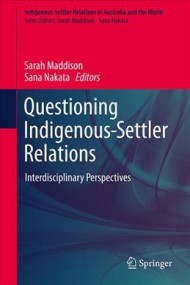
Questioning Indigenous-Settler Relations: Interdisciplinary Perspectives
Editors: Professor Sarah Maddison and Associate Professor Sana Nakata
Part of the book series: Indigenous-Settler Relations in Australia and the World (ISRAW, volume 1)
Questioning Indigenous-Settler Relations: Interdisciplinary Perspectives examines contemporary Indigenous affairs through questions of relationality, via a wide range of interdisciplinary perspectives. Relationality functions as a key analytical framework with which to explore the what, who, when, where, and why of Indigenous-settler relations; who steps into these relations and how; what are the different temporal and historical moments in which these relations take place and to what effect; where do these relations exist around the world and what are the variations they take on in different places; and why are these relations important for the examination of social and political life in the 21st century?
Its unique approach represents a deliberate move away from both settler-colonial studies, which examines historical and present impacts of settler states on Indigenous peoples, and from postcolonial and decolonial scholarship, which predominantly focuses on how Indigenous peoples speak back to the settler state. It explores the issues that inform, shape, and give social, legal, and political life to relations between Indigenous and non-Indigenous peoples, both in Australia and globally.
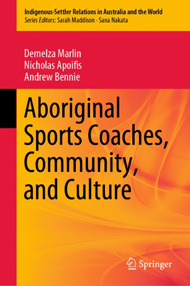
Aboriginal Sports Coaches, Community, and Culture
Authors: Dr Demelza Marlin, Associate Professor Nicholas Apoifis and Associate Professor Andrew Bennie
Part of the book series: Indigenous-Settler Relations in Australia and the World (ISRAW, volume 2)
Aboriginal Sports Coaches, Community, and Culture is the first to celebrate the stories of this group of Aboriginal mentors and leaders and present them in a form that is accessible to both academic and general audiences. In this book, Aboriginal sport coaches from all over Australia share stories about their involvement in sport and community, offering insight into the diverse experiences of Aboriginal people in settler colonial Australia.
This collection amplifies the public voice of Aboriginal coaches who are transforming the social, cultural, and political lives of Aboriginal and non-Aboriginal people. These stories have been overlooked in public discussion about sport and indigeneity. Frank and often funny, these intimate narratives provide insight into the unique experiences and attitudes of this group of coaches. This book deepens our understanding of the shared and contested history of Aboriginal peoples’ engagement with sport in Australia.
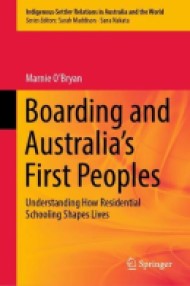
Boarding and Australia's First Peoples: Understanding How Residential Schooling Shapes Lives
Author: Dr Marnie O'Bryan
Part of the book series: Indigenous-Settler Relations in Australia and the World (ISRAW, volume 3)
Boarding and Australia's First Peoples: Understanding How Residential Schooling Shapes Lives takes us inside the complex lived experience of being a First Nations student in predominantly non-Indigenous schools in Australia. Built around the first-hand narratives of Aboriginal and Torres Strait Islander alumni from across the nation, scholarly analysis is layered with personal accounts and reflections. The result is a wide ranging and longitudinal exploration of the enduring impact of years spent boarding which challenges narrow and exclusively empirical measures currently used to define ‘success’ in education.
Used as instruments of repression and assimilation, boarding, or residential, schools have played a long and contentious role throughout the settler-colonial world. In Canada and North America, the full scale of human tragedy associated with residential schools is still being exposed. By contrast, in contemporary Australia, boarding schools are characterised as beacons of opportunity and hope; places of empowerment and, in the best, of cultural restitution.
In this work, young people interviewed over a span of seven years reflect, in real time, on the intended and unintended consequences boarding has had in their own lives. They relate expected and dramatically unexpected outcomes. They speak to the long-term benefits of education, and to the intergenerational reach of education policy.
This book assists practitioners and policy makers to critically review the structures, policies, and cultural assumptions embedded in the institutions in which they work, to the benefit of First Nations students and their families. It encourages new and collaborative approaches Indigenous education programs.

Public Policy and Indigenous Futures
Editors: Associate Professor Nikki Moodie and Professor Sarah Maddison
Part of the book series: Indigenous-Settler Relations in Australia and the World (ISRAW, volume 4)
Public Policy and Indigenous Futures focuses on Indigenous self-determined and community-owned responses to complex socioeconomic and political challenges in Australia and explores Indigenous policy development and policy expertise. It critically considers current practices and issues central to policy change and Indigenous futures. The book foregrounds the resurgence that is taking place in Indigenous governing and policy-making, providing case studies of local and community-based policy development and implementation. The chapters highlight new Australian work on what is an international phenomenon.
This book brings together senior and early career political scientists and policy scholars, and Indigenous and non-Indigenous scholars working on problems of Indigenous policy and governance.